
13 B2B Content Marketing Agencies and Services to Generate Revenue in 2024
These B2B content marketing agencies can create strategies and content that generates serious revenue for your business.
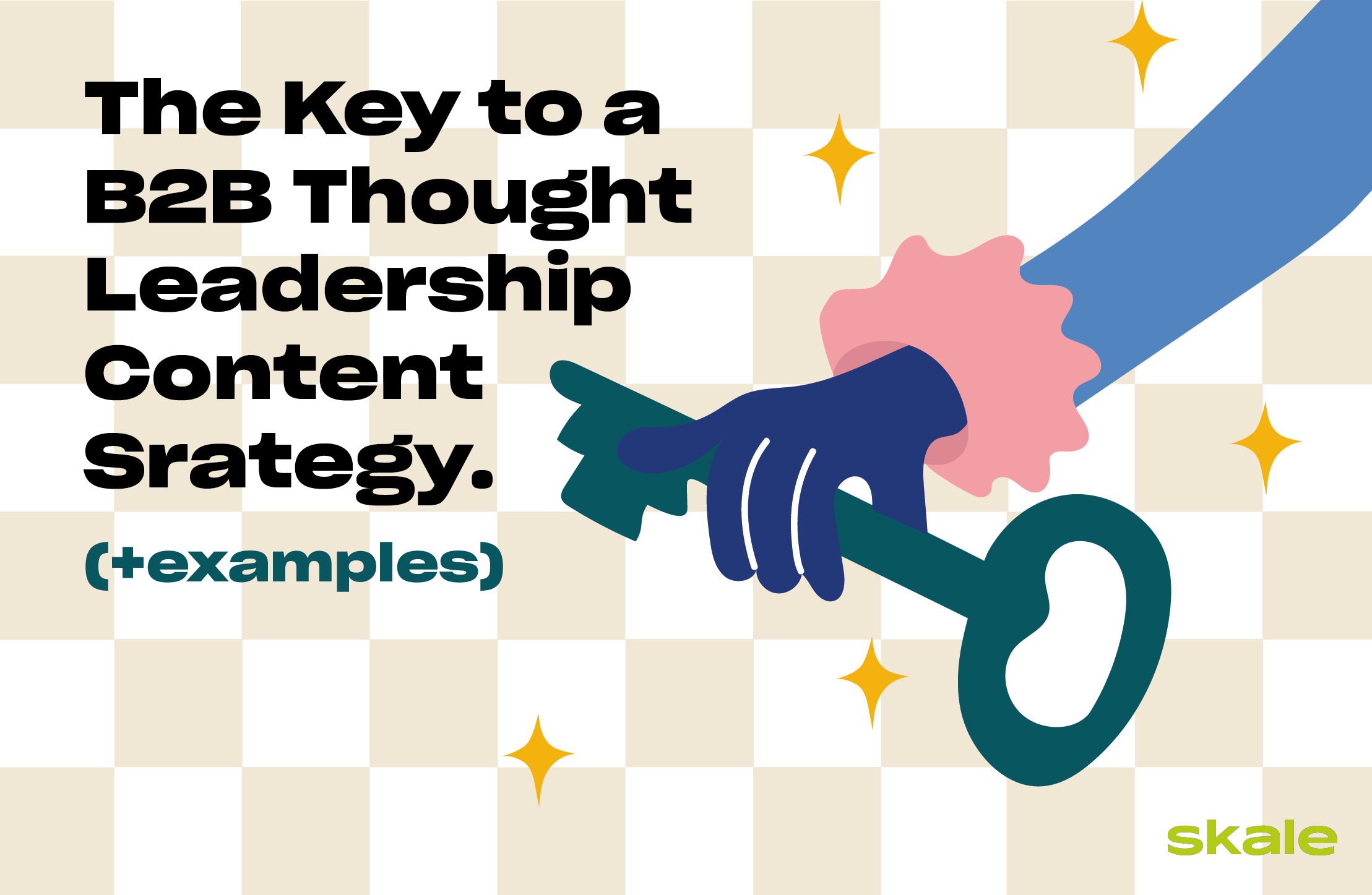

In the rapidly evolving world of B2B marketing, establishing a strong thought leadership presence has become crucial for organizations aiming to stand out from the competition and cultivate trust among their target audience. At the heart of this strategy lies B2B thought leadership content, a powerful tool that defines industry authority, provides valuable insights and generates innovative ideas. However, creating effective thought leadership content comes with its fair share of challenges.
B2B thought leadership content encompasses the creation and distribution of high-quality, authoritative content that positions a company as a trusted industry leader. It goes beyond promotional messaging, focusing on sharing valuable insights, expert opinions, and forward-thinking concepts. By offering educational, informative, and inspiring content, businesses aim to establish themselves as reliable sources of industry knowledge and expertise.
However, crafting thought leadership content presents various obstacles that organizations must overcome:
Addressing these challenges requires a well-crafted B2B thought leadership content strategy that not only overcomes obstacles but also harnesses the full potential of thought leadership to drive business growth and industry influence.
By exploring successful examples and implementing best practices, here we’ll learn how companies can position themselves as trusted thought leaders in their industries.
Great B2B thought leadership content can do wonders for your business. Take Neil Patel for example:
“Neil Patel publishes tons of thought leadership content, and it vastly improves brand awareness for his marketing agency. His platforms – from his YouTube channel to his podcast and website – are hubs offering free, niche marketing and SEO content, successfully positioning Neil Patel as the go-to expert in the industry.
When listening to his podcast, for instance, you may think, ‘I wish I had someone like this on my team!’ and collaboration with his agency is available – that’s why thought leadership content is valuable.”
– Joshua Host, Founder of Thrivelab
To write and create thought leadership content, it’s important to have a solid understanding of its key characteristics:
Besides this, it’s important to keep in mind two additional factors. One is implementing effective distribution and promotion, which are essential to reach a wider audience and boost your content’s impact. And lastly, your content should show a touch of personality:
“The biggest mistake I see in thought leadership right now is people using AI to write their pieces! When it comes to thought leadership, your personal style and distinctive, recognizable tone are everything! People expect that what you’ve written is going to be congruent with the personal brand you’ve cultivated. If it’s not, it at best sounds bland and boring and at worst, hurts the trust you’ve established with your ideal audience.
Personal anecdotes and specific examples are much better than fluff for a few reasons. It demonstrates your authority and what makes you unique. It also will likely help with SEO as Google increases the priority it places on helpful content and personal perspectives.”
– Sara Bodner, Digital Content Manager at Conklin Media
Creating thought leadership content offers numerous benefits for businesses. Here are some key advantages of thought leadership content:
“When done well, thought leadership does a few things that are important to attract new clients. It demonstrates your expertise, highlights your tone of voice, and gives an indication of what it might be like to work with you, and finally, if you’re addressing your perfect client’s challenges in an authentic and helpful manner – leading to business!”
– Charlie Southwell, Marketing Director of Let’s Talk Talent
By leveraging thought leadership content, businesses can enjoy these benefits, ultimately driving growth, establishing industry influence, and building strong relationships with their target audience.
“The advantage of building thought leadership content is multi-fold. First of all, you become the conversation starter, which gives you the best position in marketing communication. The beginners perceive you as an expert in the field, giving you credibility in the existing as well as the next generation. The thought leadership content is also copied by other people, and they link the original B2B content as a reference, which gives the business website a word-of-mouth promotion.”
– Faizan Fahim, Content Marketing at InfraCloud

We’ve taken a deep dive into 15 customer acquisition strategies that increase revenue (hint: they all involve quality content!)
Read the full articleNow, the time has arrived to start producing your own insightful B2B thought leadership content strategy. We’ve made it super easy for you by putting together nine key steps to follow:
“The main mistake I see in thought leadership is that it becomes too self-promotional. The content should be about the challenges your audience has, not you. If you can avoid that pitfall you will demonstrate your expertise and become trusted automatically without a pitch.“
– Charlie Southwell, Marketing Director of Let’s Talk Talent
Before diving into creating thought leadership content, it’s crucial to understand the challenges, questions, and pain points of your target audience. Conduct market research, engage with your audience through surveys or interviews, and analyze industry trends to gain insights into their needs and interests.
“One of the biggest mistakes in creating thought leadership content is not understanding your target audience well enough. Whether you want to generate brand awareness or leads, it’s important to know who the content is targeted towards. Without this perspective, it’s impossible to create truly helpful content. A lack of audience understanding can prevent you from covering the right topics and themes, meaning your content will keep missing the mark.“
–Shivani Maheshwari, Content Specialist at WrittenlyHub
Define clear objectives for your thought leadership content strategy. Determine what you want to achieve, whether it’s establishing your brand as an industry authority, generating leads, or increasing customer engagement. Setting measurable goals will help you track the success of your strategy—and allow you to spend your marketing budget wisely.
“Get a general understanding of your business goals and refine them into focused aspects that you can work on. These focus points should best represent your business’ brand through your strength, interest, subject matter expertise, and market trends.” –Chiam Canda, Jr. Marketing Director at Evolv Branding, Advertising, and Marketing
Incorporate expert insights and opinions into your thought leadership content to provide valuable and unique perspectives. Collaborate with industry influencers, thought leaders or subject matter experts to contribute their expertise through interviews, guest blog posts, or quotes. This will enhance the credibility and depth of your content.
“B2B thought leadership material, defined by me as a sales director, is high-quality, intelligent, and authoritative content that positions a firm or individual as a trusted industry leader and expert. Thought leadership content is intended to educate, inspire, and influence the intended audience, making the creator a go-to resource in their industry.” –Derrick Hathaway, Sales Director at VEM Medical
Your thought leadership content should reflect a consistent brand voice that aligns with your overall brand image. Establish a distinctive, recognizable tone that resonates with your audience. Avoid generic or AI-generated content and instead focus on personal anecdotes, specific examples, and a human touch that adds value and builds trust.
“Another mistake is using a tone that’s perhaps too casual for the purpose. When it comes to thought leadership content, it’s important to have a confident, affirmative, and sincere tone of voice. If your thought leadership content sounds too conversational or informal, your audience may have a tough time taking you seriously.” –Shivani Maheshwari, Content Specialist at WrittenlyHub
Thought leadership content can take various formats such as blog articles, whitepapers, videos, podcasts, webinars, infographics, or case studies. Choose the formats that resonate with your target audience–after all, by now your market research should give you this information–and align with your objectives.
Remember you can always repurpose content across different formats to maximize its reach and impact. For example, an insightful case study can be turned into a podcast episode, a colorful infographic, or the prime data for a blog article.
“A common mistake in thought leadership content is relying solely on text without utilizing engaging mediums like videos and podcasts. Limiting content to written articles lessens your chance to connect with audiences in more dynamic and immersive ways.
Videos can capture attention through visuals, body language, and storytelling, while podcasts create an intimate and conversational experience. These formats allow for greater authenticity, personal connection, and the ability to showcase expertise in a relatable manner.
Incorporating videos and podcasts into your thought leadership strategy amplifies your message, reaches a broader audience, and stimulates deeper engagement. It also caters to different learning styles and enhances the impact of your thought leadership efforts.”
–Milo Cruz, CMO at Freelance Writing Jobs
Create a dedicated blog section on your website to publish and showcase your thought leadership content. Ensure your content is easily accessible and well-organized. Additionally, you can leverage social media platforms to amplify your reach and engage with your audience. Share snippets, teasers, or key takeaways from your thought leadership content on platforms where your target audience is active.
“Choose the right platforms to publish thought leadership content based on your target audience. For example, if you want to reach Gen Z, TikTok is an excellent choice. Find out which social media channels your audience spends their time on and for what purpose, finalize your account, and start creating!” –Lyudmyla Dobrynina, Head of Marketing in North America for Optimeal
To maximize the impact of your thought leadership content you need to ensure you’re promoting it effectively. For example, by partnering with influential websites and industry publications for content republishing. Alternatively, you might expand your reach through guest blogging, active participation in conferences and webinars, and effective email marketing. You can also increase your social media reach by linking and sharing expert insights— most will be more than happy to share them on their social channels.
Here are some ways to promote your content effectively:
Stay updated on the latest developments to keep your content relevant and timely. The digital age is characterized by rapid changes, and it’s crucial to be aware of-and adapt to-them. Your audience relies on you as their go-to resource, so make sure your content is always up-to-date, relevant, and of high quality.
Quality should always be prioritized over quantity–especially in thought leadership content. Focus on meeting and producing high-relevance and quality content and you’re looking at a successful thought leadership strategy.
As with any B2B strategy, once it’s been working for a bit, you’ll want to measure and see how it’s doing. Are your goals being met? If not, can you find out where the problem is? Then address it. Always be on the lookout for where you can improve and what your audience is telling you.
“It’s crucial to track and evaluate the effectiveness of your thought leadership material. Missed opportunities for improvement might result from failing to monitor essential indicators or collect audience input. Measure engagement, website traffic, conversions, and other vital data with analytics tools. Pay close attention to audience response to spot potential improvement areas.”
–Krupa Trivedi, Digital Marketing Manager at On-Demand Ninja
Want more? Here are 10 tactics that you can use to level up your overall content marketing strategy.
Now that we know why it matters and how to create it, let’s see three real-life examples of excellent B2B thought leadership content.
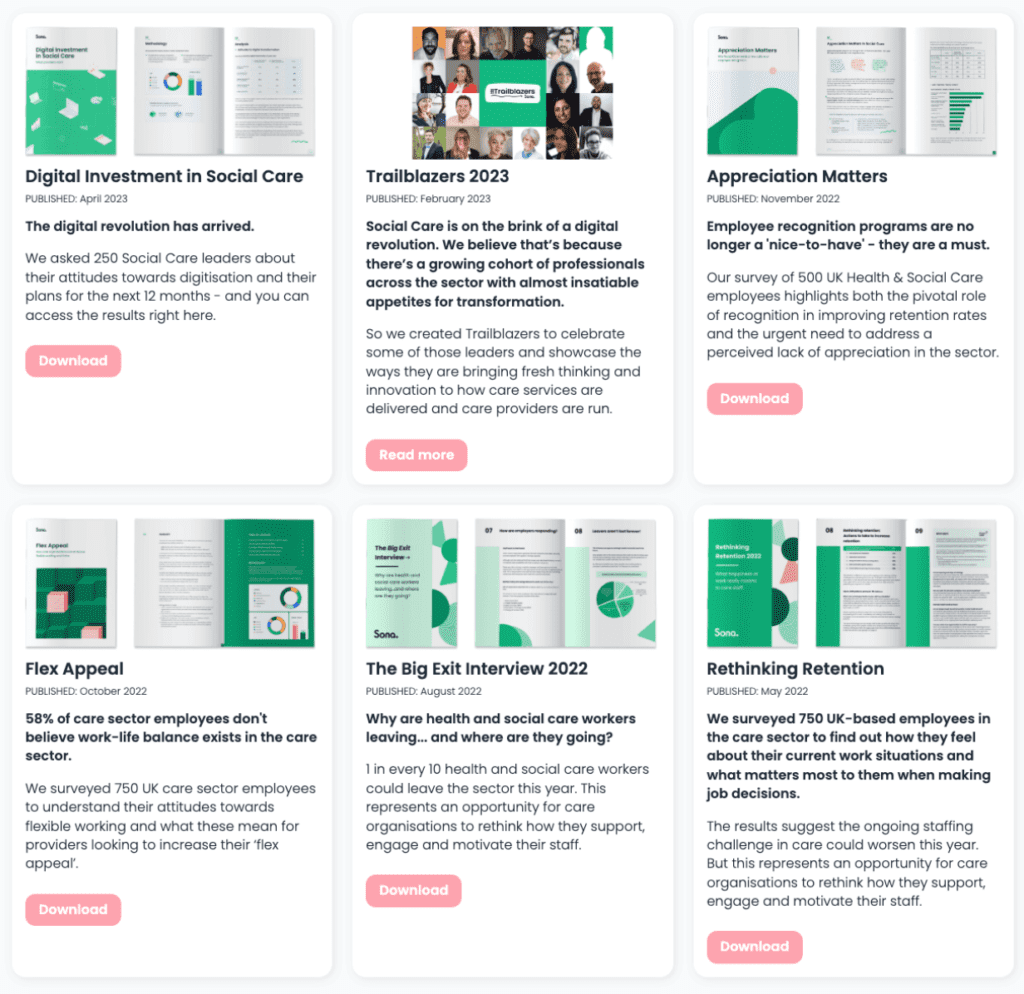
Sona, a workforce management software for Social Care, is a great example of thought leadership content done well. Besides their popular blog and webinars, they are well-known in their industry for creating high-quality and relevant reports. Their Appreciation Matters report was so valuable that it has been cited by leading industry experts like The Care Home Environment and UK Care Week. This shows that to become a thought leader in your industry, you need to show your expertise and bring something new to the table.
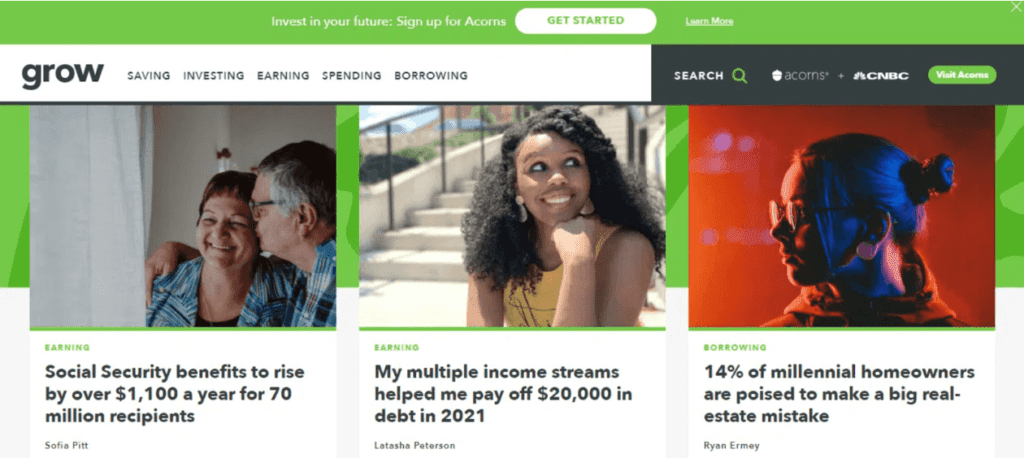
Acorns, the micro-investment app, teamed up with CNBC in 2019 to create a blog where consumers could find answers to their financial queries.
Named Grow, the blog covered a wide range of financial wellness topics, featuring interviews with billionaire investors and experts. While the focus was not solely on investing (Acorns’ industry), it offered valuable information to potential future customers. This partnership started in 2019, and in June 2022 the chairman of CNBC released a statement saying the editorial project will be coming to an end. However, CNBC still offers a financial wellness website called ‘Invest in You.’
Although a thing of the past, this project between these two corporations is an excellent example of thought leadership and what focusing on your target audience can do: “When we began producing Grow content in 2019, the site had 105,000 unique visitors and this year, we hit a record 6.5 million.” –Mark Hoffman, Chairman at CNBC

Discover how other brands are scaling their business with this list of key insights from real case studies.
Read the list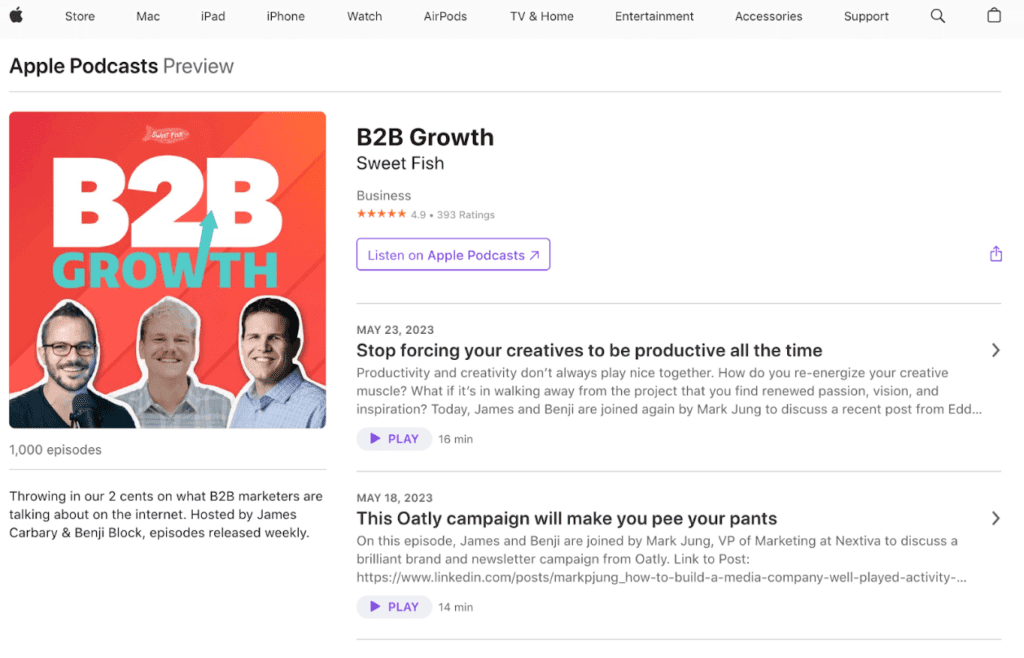
B2B Growth is Sweet Fish’s podcast, which discusses all things B2B marketing and growth are discussed. With more than 1,000 episodes, and a 4.9-star rating with 393 reviews, you know this podcast is giving people what they want.
Not only do they ensure to provide valuable information to their listeners, but they also make sure their personalities shine through. Hosts James Carbary and Benji Block have now made a name for themselves, boasting 30,000 and 3,000 LinkedIn followers respectively.
The best thing is that this podcast discusses all the things related to B2B marketing, even though Sweet Fish is a media production company. So, they talk about topics that might not necessarily have to do with what they do, but that future customers will be wanting to know and learn more about.
“The main benefit of thought leadership content is that it gives credibility and authority to your brand. When you say something that resonates on an intellectual level, that offers truly insightful commentary, it raises the quality of your reputation. You become the go-to source for information. And in turn that increases how much trust people have in everything you do, including your products.” –Jinwoo Park, Content Writer, Chameleon
As Jinwoo says, B2B thought leadership content is essential for standing out in the competitive B2B marketing landscape and building trust with your target audience.
However, to create exceptional B2B thought leadership content, it is essential to provide unique perspectives, address audience challenges effectively, establish credibility, foster innovation, and ensure clarity and engagement throughout the content creation. We get it, it’s not always easy—which is why we’ve put together a step-by-step on how to create an effective B2B thought leadership content strategy.
Here are the steps:
However, all of these steps can be easier when you have a specialized B2B content marketing, like Skale, by your side.
Unlock the potential of your B2B content marketing journey with the unrivaled expertise of Skale. It’s time to turn your aspirations into reality and set your brand apart with Skale’s expert content marketing services by your side.

Looking for a B2B content marketing agency that delivers? We’ve narrowed it down to a list of your top 15 choices.
Read the listLearn more about
B2B CONTENT MARKETING

13 B2B Content Marketing Agencies and Services to Generate Revenue in 2024
These B2B content marketing agencies can create strategies and content that generates serious revenue for your business.
![Ignite Engagement: 9 B2B Content Marketing Ideas [with Expert Insights]](png/skale-december-4-360x230.png)
Ignite Engagement: 9 B2B Content Marketing Ideas [with Expert Insights]
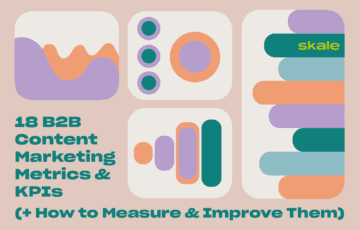
18 B2B Content Marketing Metrics & KPIs (+ How to Measure & Improve Them)
We look at which B2B content marketing metrics you should measure, how to measure them, and what to do when you need to improve your content strategy.